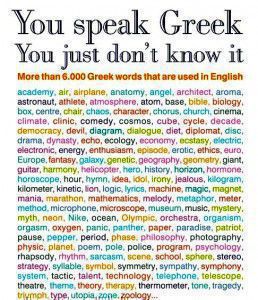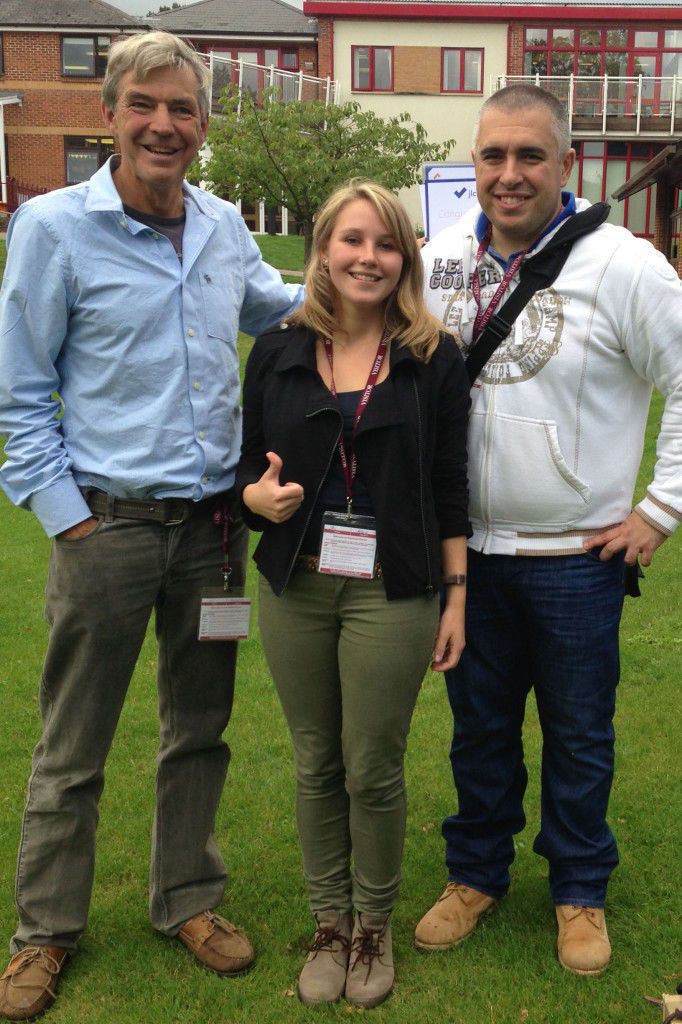Getting to know you: ‘Hallo’ from Lorena
My name is Lorena and I am from Germany. I just finished school and now I’ve started a placement at EuroTalk for five months. This is my third week in the company and it is very exciting. I am working on a project to help EuroTalk promote their maths apps in Germany. I’m having fun thinking about this task and I have a lot of ideas!
On my third day at EuroTalk, Wednesday 18th September, I went to the Junior Language Challenge at the Cranmore School in Surrey. It was the semi-final for London (South). At one o’clock we arrived at the school and prepared the iPads so that the children could use the Greek app.
About thirty thrilled children were ready to start! 🙂
… And after the welcome, it was finally happening.
The children were split up in two groups of thirteen and each group played the games. The children with the best score came into the final. The teachers and some parents could follow which position the children were in, because there was a whiteboard with the current score. For the children it was a very exciting situation and the teacher and parents were pretty curious.
After the challenge I saw only smiling kids! They were so happy and very proud of the certificates they got from EuroTalk.
And for me was it an interesting day and I got some impression of how EuroTalk promotes languages for children.
Lorena
Something Borrowed: when one language just isn’t enough
After reading Konstantia’s post a few months ago about how many of our everyday words come from Greek, I started to think about where some of our other words came from. You might think that we are the ones influencing everyone else (words such as wifi in French, surfear for surfing the net in Spanish, and a lot of business jargon in German – downloaden, ein Workshop, ein Meeting and so on…), and of course that’s true. Most new inventions (the Internet, computers and related tech such as wifi) are named by Americans, and therefore the English word is often passed along to other cultures and absorbed into their languages. You’ll also find many non-English speakers throwing in English phrases amidst their native tongue. Any other Borgen fans will probably have noticed the way that characters casually use phrases such as ‘on a need to know basis’ whilst otherwise conversing in Danish. Clearly our language, especially in the business, IT and entertainment domains, has a huge global influence.
 However, if you look a little further back, you’ll find us doing exactly the same thing. It might seem incredibly cool to Europeans now to use English or merely ‘English-sounding’ words day to day, but we’re just as guilty of language-envy or just pure laziness with French, especially. How to describe that annoying feeling of being sure you’ve already seen or done something? Déjà vu, of course. Not to mention dozens of other words and phrases we all use on a daily or regular basis: laissez faire, enfant terrible, a la carte, a la mode, arte nouveau, en route, faux pas… I could go on for pages. You’d probably struggle to go through a day without using at least one or two obviously French words. It’s almost as if we simply couldn’t be bothered to think of our own words for some of these things, although I also suspect it has a lot to do with our associations with French as chic (another one!) and sexy. This is especially true in the beauty industry, which explains the proliferation of products labelled visage or with names like touche eclat remaining in their original alluring French guise.
However, if you look a little further back, you’ll find us doing exactly the same thing. It might seem incredibly cool to Europeans now to use English or merely ‘English-sounding’ words day to day, but we’re just as guilty of language-envy or just pure laziness with French, especially. How to describe that annoying feeling of being sure you’ve already seen or done something? Déjà vu, of course. Not to mention dozens of other words and phrases we all use on a daily or regular basis: laissez faire, enfant terrible, a la carte, a la mode, arte nouveau, en route, faux pas… I could go on for pages. You’d probably struggle to go through a day without using at least one or two obviously French words. It’s almost as if we simply couldn’t be bothered to think of our own words for some of these things, although I also suspect it has a lot to do with our associations with French as chic (another one!) and sexy. This is especially true in the beauty industry, which explains the proliferation of products labelled visage or with names like touche eclat remaining in their original alluring French guise.
French is the best example, as they are our nearest geographical neighbours, and historically one of our closest political connections, which explains the huge interconnection of our languages. However, as soon as you think about it, there are hundreds of other words that have crept into our parlance from other languages. Words like Zeitgeist and one of my favourites Schadenfreude have come over from German, whilst our food vocabulary owes a lot to Spanish (salsa, jalapeno, tortilla, nacho, paella…) We’re also becoming ever more familiar with words and especially foods from China and Japan. Sushi, sake, kimono, karate, karaoke and so on are everyday words to us, whilst we happily order bok choy, chop suey and chow mein without even thinking about it, not to mention concepts like yen, zen and feng shui. Taekwondo has made its way over from Korea, whilst we’ve taken words like bamboo and paddy from Malay.
This is just a quick look at some of the more obvious ways that our language has spread globally, and how many words we have absorbed from nearby European countries, but also from more distant Asian cultures. We’re such a global country, and it’s strongly reflected in our language. We’d love to hear more examples of English words creeping into other languages or other foreign words you’ve noticed in English, so feel free to leave a comment below!
Alex
So, did you know you can speak Greek?
Today’s blog post is written by Konstantia Sotiropoulou, who’s been helping us to translate and record our Maths apps in Greek.
I bumped into the picture below a while ago and I thought this should be interesting. Undoubtedly, Greek is one of the richest languages in the world and is distinguished by an extensive vocabulary. In the past, the Guinness Book of Records ranked the Greek language as the richest in the world with 5 million words and 70 million word types!

The front cover of You speak Greek, You just don't know it, a book by Annie Stefanides (Ianos, 2010)
Well, many of these words have been widely borrowed into other languages, including English. Greek roots are often used to coin new words for other languages, especially in the sciences and medicine. Mathematics, physics, astronomy, democracy, philosophy, athletics, theatre, rhetoric, baptism and hundreds of other words are Greek. Moreover, Greek words and word elements continue to be productive as a basis for coinages: anthropology, photography, telephony, isomer, biomechanics, cinematography, etc. and form, with Latin words, the foundation of international scientific and technical vocabulary, e.g. all words ending with –logy (“discourse”). Interestingly, an estimated 12% of the English vocabulary has Greek origin. Greek has contributed to English in several ways, including direct borrowings from Greek and indirectly through other languages (mainly Latin or French).
In a typical 80,000-word English dictionary, about 5% of the words are directly borrowed from Greek; this is about equivalent to the vocabulary of an educated speaker of English (for example, “phenomenon” is a Greek word and even obeys Greek grammar rules as the plural is “phenomena”). However, around 25% are borrowed indirectly. This is because there were many Greek words borrowed in Latin originally, which then filtered down into English because English borrowed so many words from Latin (for example, “elaiwa” in Greek evolved into the Latin “oliva”, which in turn became “olive” in English).
Greek and Latin are the predominant sources of the international scientific vocabulary. Greek is often used in coining very specialized technical or scientific words, however, so the percentage of words borrowed from Greek rises much higher when considering highly scientific vocabulary (for example, “oxytetracycline” is a medical term that has several Greek roots).
In education, an excellent way to build vocabulary is teaching students how to find roots in words. Since many words have their base in the Greek language, beginning with the roots from this ancient language is a good place to start. This list of English words with Greek origin will give students a basis for further exploration into the roots of the English language.
Now you that you have seen how many Greek words you know, I am going to teach you some more common ones like “kalimera” which means “good morning”, “Ya sou” which means “hi”, “Me lene” which means “my name is” and “efharisto” which means “thank you”. And if you are interested in learning more and discovering how many you already know, try EuroTalk’s uTalk Greek app.
And who am I to be talking about the Greek language? I am the Greek intern of EuroTalk, who translated and recorded into Greek their new Maths apps for young children. An interesting and fun experience for a young translator like me. I have to say that I really enjoyed working in this office, which gives you the sense of a family home. People here are calm and friendly, the kitchen is fully equipped with all kinds of snacks and during the day we get to listen to nice music while working! How amazing is that?
I started towards the end of January by translating the scripts of the app and soon after I recorded the first topics. I caught myself playing the app more than I needed to, as the games are really fun! I am sure young kids will truly enjoy it while learning basic Mathematics rules. And I know that my three-year-old niece, who will be playing the app in a few weeks, will at least have a constructive and educational first contact with technology!
So, whether you want to take up a new language or help your child have a nice start with Maths, you know that EuroTalk is here for you!
* There is an interesting video on YouTube that explains the History of English and the influence that it had from other languages!
Konstantia
My big fat Greek mistake!
Learning a language can sometimes be fraught with problems when you try to put your new-found skill into action (like ordering the wrong thing in a restaurant), but even if you really are fluent in a language it can still backfire on you.
Some 25 years ago, when I was finally fluent in Modern Greek and often being mistaken for being a true Athenian Greek, I used to travel to all parts of Greece at a moment’s notice with my children, or with friends – no advance bookings, we’d just get the air tickets to Athens and decide which island to go to once we arrived. My knowledge of the Greek language always stood us in good stead and we seldom had problems. It also meant that we were offered much hospitality by the Greeks, who are such welcoming and lovely people to know.
One day, back here in the smoke, a friend took me to a Greek restaurant he’d found in Bayswater, and it was a terrific place. A musician played the bazouki, we danced a lot, the food was wonderful and we spent the whole evening speaking English and Greek alternately. When my friend asked for the bill, the manager came over and asked us whether we were English or Greek, because he’d heard us speaking both languages and he was puzzled as to our nationality. When he discovered we were both English but had learned to speak Greek at home with books and cassettes, but without formal lessons, he was very impressed. So impressed that he offered us anything on the menu as a gift. It was not difficult for me to choose. I absolutely love halva. That was my selection. I hadn’t remembered that the halva you get in a Greek taverna is not the halva that you’d buy in the shops. Instead, it’s made with semolina and it’s the one I don’t like!
Needless to say, when it was served to me I couldn’t find it in me to turn it away, so I ate as much as I was able to. I thanked him profusely and then said I was full up, having already eaten three courses before it, and this was accepted by the manager. No big deal, you might think. However, more than six months later I returned to that Greek restaurant and took with me a male relation who was in London on a visit, thinking it was unlikely that I’d be remembered especially as I was with someone else and there would be no Greek spoken that evening.
Imagine my chagrin when, at the end of the meal and with nothing being said about it, the halva was presented to me once more. I couldn’t believe it. I ate it manfully (or perhaps it should be womanfully) and made up my mind to not go back there any more. It was such a pity because their hospitality was second to none.
What would you have done?
Gloria




